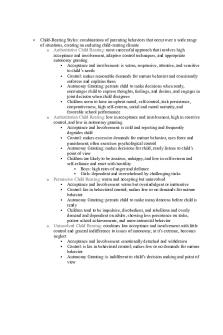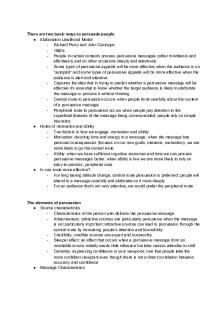Essentials of Psychology Chapter 8 PDF

| Title | Essentials of Psychology Chapter 8 |
|---|---|
| Course | Essentials Of Psychology |
| Institution | Rowan University |
| Pages | 6 |
| File Size | 109.3 KB |
| File Type | |
| Total Downloads | 112 |
| Total Views | 160 |
Summary
Professor Eve Sledjeski...
Description
Chapter 8.1: How Memory Functions Learning Objectives: • • • •
3 basic functions of memory 3 stages of memory storage Procedural and declarative memory Sematic and Episodic memory
Memory • •
Information processing system Memory- set of processes used to encode, store, and retrieve information over different periods of time
Encoding > Storage > Retrieval •
Encoding- process that inputs information into the memory system - Paying attention, taking in information
•
Automatic processing- encoding of details like time, space, frequency, and the meaning of the words
•
Effortful processing- requires work and attention to encode information
Three Types of Encoding • • •
Semantic encoding- encoding of words and their meaning Visual encoding- encoding of images Acoustic encoding- encoding of sounds (words)
Storage •
Storage- creation of a permanent record of information - How people retain encoded information
•
Memories go to storage by passing through three stages: - Sensory memory - Short-term memory - Long-term memory
•
Sensory memory- storage of brief sensory events, such as sights, sounds, and visuals
•
Short-term memory- temporary storage system that processes incoming sensory memory - Storage lasts 15-30 seconds
•
Rehearsal- moves information from short to long-term memory
•
Long-term memory- continuous storage of information - Memory storage capacity is believed to be unlimited - People are able to remember things that occurred more than a few minutes before
•
Explicit memories- memories we consciously try to remember, recall, and report
•
Episodic memory- information about events we have personally experienced
•
Semantic memory- knowledge about words, concepts, and language-based knowledge and facts
•
Implicit memories- long-term memories that are not part of our consciousness - Procedural: how to do things - Priming: stimulus exposure affects responses to a later stimuli - Emotional conditioning: classically conditioned emotional response
Chapter 8.2: Parts of Brain involved with Memory Learning Objectives: • •
Brain functions involved in memory Roles of hippocampus, amygdala, and cerebellum
•
Engram- the group of neurons that serve as the “physical representation of memory”
•
Equipotentiality hypothesis- if part of one area of the brain involved in memory is damaged, another part of the same area can take over that memory function
The Amygdala • Main role is to regulate emotions • Plays a role in how memories are stored because storage is influenced by stress hormones The Hippocampus • •
Main role is memory - Has to do with normal recognition and spatial memory Gives memories meaning and connects them with other memories
The Cerebellum & Prefrontal Cortex • •
Cerebellum- able to create implicit memories Prefrontal cortex- process and retain information - Not fully developed until age 25 - Allows people to plan ahead and suppress impulses - Has to do with higher order thinking
Neurotransmitters • Involved with process of memory: - Epinephrine - Dopamine - Serotonin - Glutamate •
Flashbulb memory- clear recollection of important event
Chapter 8.3: Problems with Memory Learning Objectives: • • • • •
Two types of amnesia Unreliable eyewitness testimony Encoding failure Memory errors Two typed of inference
Amnesia •
Amnesia- loss of long-term memory as a result of disease, physical trauma, or psychological trauma
•
Anterograde amnesia- unable to make new memories as a result of brain trauma
•
Retrograde amnesia- loss of memory for events that occurred prior to trauma - Cannot remember some or all of their past
Memory Construction and Reconstruction •
Construction- formulation of new memories reconstruction-process of bringing up old memories
•
Suggestibility- describes the effects of misinformation from external sources that leads to the creation of false memories
•
Misinformation effect paradigm- after exposure to additional and possibility inaccurate information - Person may misremember the original event
Controversies over Repressed and Recovered Memories •
False memory syndrome- recall of false auto-biographical memories
•
Forgetting- refers to loss of information from long-term memory
•
Encoding failure- memory loss that happens before the actual memory process begins
Memory Errors •
Schacter’s Seven Sins of Memory- 7 ways our memories fail us - Transience: accessibility of memory decreases over time - Absentmindedness: forgetting caused by lapses in attention - Blocking: accessibility of information is temporarily blocked - Misattribution: source of memory is confused - Suggestibility: false memories - Bias: memories distorted by current belief system - Persistence: inability to forget undesirable memories
Interference •
Information stored in our memory, but it is inaccessible - Proactive interference: when old information hinders the recall of new information - Retroactive interference: new information hinders recall of old information
Chapter 8.4: Ways to Enhance Memory Learning Objectives: • •
Memory-enhancing strategies Effective study techniques
Memory- Enhancing Strategies • • • •
Rehearsal- repetition of information to be removed Chunking- organize information into manageable bits or chunks Elaborate rehearsal- technique in which you think about the meaning of new information and its relation to knowledge already stored in your memory Mnemonic devices- memory aids that help us organize information for encoding
How to Study Effectively • • • • • • • • •
Use elaborative rehearsal Apply the self-reference effect Use distributed practice Rehearse Study efficiently Be aware of interference Keep moving Sleep Make use of mnemonic devices...
Similar Free PDFs

Essentials Chapter 8
- 12 Pages

Social psychology chapter 8
- 6 Pages

Psychology Chapter 8 homework
- 3 Pages

Psychology Chapter 8 Notes
- 6 Pages

Essentials of IR Chapter 1
- 4 Pages
Popular Institutions
- Tinajero National High School - Annex
- Politeknik Caltex Riau
- Yokohama City University
- SGT University
- University of Al-Qadisiyah
- Divine Word College of Vigan
- Techniek College Rotterdam
- Universidade de Santiago
- Universiti Teknologi MARA Cawangan Johor Kampus Pasir Gudang
- Poltekkes Kemenkes Yogyakarta
- Baguio City National High School
- Colegio san marcos
- preparatoria uno
- Centro de Bachillerato Tecnológico Industrial y de Servicios No. 107
- Dalian Maritime University
- Quang Trung Secondary School
- Colegio Tecnológico en Informática
- Corporación Regional de Educación Superior
- Grupo CEDVA
- Dar Al Uloom University
- Centro de Estudios Preuniversitarios de la Universidad Nacional de Ingeniería
- 上智大学
- Aakash International School, Nuna Majara
- San Felipe Neri Catholic School
- Kang Chiao International School - New Taipei City
- Misamis Occidental National High School
- Institución Educativa Escuela Normal Juan Ladrilleros
- Kolehiyo ng Pantukan
- Batanes State College
- Instituto Continental
- Sekolah Menengah Kejuruan Kesehatan Kaltara (Tarakan)
- Colegio de La Inmaculada Concepcion - Cebu










